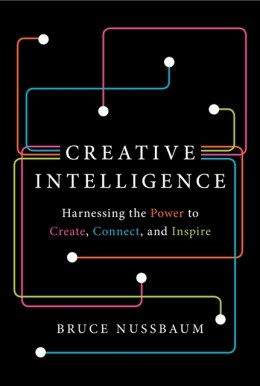
In his new book Creative Intelligence, Bruce Nussbaum argues that creativity is an undervalued skill that anyone can cultivate. Not just for artists and musicians, he argues, creative intelligence — or CQ for short — is what separates the winners and losers of the business world as well. The author, a professor at Parsons The New School for Design in New York, recently spent a few minutes explaining how each of us can go about cultivating our own CQ.
What is creative intelligence?
Taking original ideas and scaling them into the creation of new products and services. I really believe that we are all born with a capacity to be creative, and we get it beat out of us in a lot of the schools that we go to. We have to relearn it, and it’s not that hard.
How can we be more creative?
Creativity is all about making connections and seeing patterns. It’s not a light bulb that goes off in your head. Before that light bulb goes off, lots of things are happening. Lots of ideas. We need time to step back and make connections between those things. We need to stop being hyperconnected and deliberately take a moment to be mindful about what we’re doing.
People often associate creativity with solo artists, but you argue that collaboration fosters creativity more often than working alone. How so?
Creativity is social. When you read books about creativity today, the narrative of creativity is that it is a brain function or it’s a genius thing. It is rare and comes out of the individual. But when you look at almost all the innovations that are meaningful in our lives today, like Facebook and Google, they’re all done by two or three people. All the innovators have a buddy.
(MORE: Will Reform of Fannie and Freddie Kill the 30-Year Mortgage?)
Yahoo recently announced a controversial ban on working from home on the grounds that being physically together improves speed and quality. Does this argument hold water?
Creativity comes out of small teams of twos and threes and fours and fives and sixes. That’s quite different from having thousands and thousands of people in the same place at the same time. You can also put technology in people’s homes that allows them to communicate with small teams to be social and creative. It’s probably not really required to have everyone in the office, but you do need certain people interacting.
Why don’t old-fashioned brainstorming sessions work for generating new ideas in companies?
When you go to a lot of brainstorming sessions, you have people throwing ideas out that have absolutely no relation to the specific topic at hand. In these kinds of environments, people hold back their best ideas. They’re not going to share it with strangers. It doesn’t work. Instead you need “magic circles,” small teams of people who trust each other, are familiar with each other, and play together. That’s where you get some really great originality that has value.
(MORE: Payday Loans Are Bad Enough Without Banks Getting into the Act)
You cite Groupon as an example of a creative company, thanks to its popular daily deal strategy, but it just fired its CEO amid big losses. What gives?
People were saying, “Give me 50% off, sure.” But whether they go back again and again is something very different. It turned out people didn’t want to do that. Groupon seems to have plateaued at a certain level, and it’s possible that they can’t go beyond that level. It’s still a successfully creative company. It just means that it’s a company that’s not going to grow all that much larger, and its stock price isn’t going to go much higher.
What is the “economy of creativity” and why do we need to pay more attention to that instead of mere efficiency?
The true source of economic activity is creativity. It’s coming up with new things that give us fat profits. That is more beneficial to shareholders in the long run, generates more jobs, and is better for all of us than an economy based on efficiency. We should go back to the origins of capitalism and accept the fact that creativity is the source of economic value and creativity drives capitalism.
Dell became a top PC maker because of its efficiency. Now it’s struggling. Did putting efficiency first compromise its creativity?
No. The great creative model of Dell was its efficiency. It was brilliant. Just go online and you could create your own computer, made to order. It was wildly successful until it wasn’t. I think it’s failing because it doesn’t allow you to create the products you want to create today. No one wants to create a computer any more.
They don’t realize that their creative model wasn’t about computers. It was about everything. If they allowed us to put together the things we wanted to put together, like an iPhone or another smartphone, it would be wildly successful. They think they are a computer company, and they’re not. They’re a creative assembly company.
(MORE: Warren Buffett on Why He Loves Newspapers)
What’s the best way to get out of a creative rut?
Find a creative friend to play with either at work or outside work. Read my book. Travel. See something that’s dramatically different and think about it. Disconnect every day for 20 minutes and think about what you’re doing and how you can do it better. Think about your creativity and then go back in.

